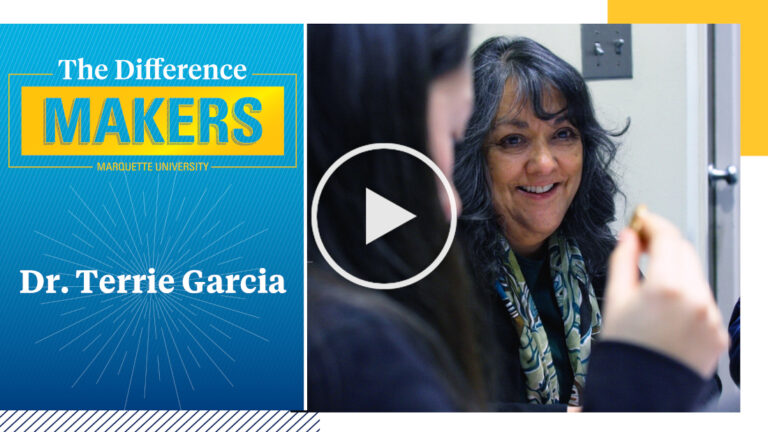Marquette University’s Office of Research and Sponsored Programs has announced the following research grants awarded to university faculty and staff in August/September 2022.
Fostering STEM Thinking in Mathematics Courses for Elementary Education Majors
$300,000 – National Science Foundation
- Marta Magiera, associate professor of mathematical and statistical sciences in the Klingler College of Arts and Sciences
- Abstract: This project will create instructional modules that engage prospective teachers preparing to teach in the elementary and middle grades in problem-solving, emphasizing interdisciplinary STEM practices. The project will test the effectiveness of the instructional materials on prospective teachers’ understanding of STEM thinking, their understanding of STEM integration and connections among STEM disciplines in school mathematics.
Collaborative Research: Mechanistic Studies on Fe-Type Nitrile Hydration Catalysts
$448,145 – National Science Foundation
- Brian Bennett (PI), professor of physics, and Dr. Adam Fiedler, chair and professor of chemistry, in the Klingler College of Arts and Sciences
- Abstract: In an increasingly environmentally concerned world, green chemistry alternatives to traditional energy-intensive and polluting chemical processes are highly desirable and this project will forward that goal. Additionally, studies have shown that the chirality (“handedness”) of pharmaceuticals is extremely important in their efficacy and toxicity, and the work will advance the production of chirally-pure drugs.
Predictive Mental Health Crisis Intervention Tool for Trauma & Substance Abuse
$50,000 – Medical College of Wisconsin
- Praveen Madiraju (PI), associate professor; Dr. Sabirat Rubya, Northwestern Mutual Data Science Institute Assistant Professor; Dr. Sheikh Ahamed, professor; and Dr. Niharika Jain, visiting assistant professor, all of computer science in the Klingler College of Arts and Sciences
- Abstract: This project will embed real-time artificial intelligence driven community mental health crisis detection into peer mentor (para-professional) workflows, and take initial steps toward making crisis alerting information available in a cross Electronic Health Record data standard to set the stage for both community and clinical use.
Developmental Coordination Disorder Characteristics in Children with Childhood Apraxia of Speech: An Estimation of Prevalence in the United States
$13,687 – University of Texas at Arlington (Apraxia Kids)
- Jenya Iuzzini-Seigel, assistant professor of speech pathology and audiology in the College of Health Sciences
- Abstract: The long-term goal of this project is to develop optimal assessment and treatment protocols for children with childhood apraxia of speech. The rationale for this project is that children with developmental coordination disorder are at a higher risk for mental and physical health problems, which result in a significantly lower quality of life (Caçola & Killian, 2018), especially if not properly identified and treated. Therefore, a thorough and in-depth study examining fine and gross motor characteristics and prevalence of DCD in children with CAS is needed to promote essential changes in standard care for children in this population.
Reliable Coating Service Life Prediction Considering Prevailing Uncertainties
$200,000 – Department of Army/Construction Engineering Research Lab
- Qindan Huang, associate professor of civil, construction and environmental engineering in the Opus College of Engineering
- Abstract: The goal of this study is to develop a reliability-based service life prediction framework for coating systems, which can lead to reliable coating performance evaluation, reduced maintenance costs, and improved safety for military and civil works infrastructure.
Bridging African American English for the Reading Success of Black Children
$5,018 – Next Door Foundation
- Maura Moyle, associate professor of speech pathology and audiology in the College of Health Sciences
- Abstract: Approximately 50 Head Start teachers will participate in professional development targeted at providing culturally and linguistically affirming early literacy instruction for children who speak African American English. The Marquette researcher will contribute to the design of pre- and post-assessments of teacher knowledge, assist with data collection and analysis, and provide logistical support for teacher workshops.
Previously announced:
- Marquette University receives two grants to expand Education Preparedness Program supporting those impacted by incarceration to succeed in higher education (Dr. Darren Wheelock, Dr. Theresa Tobin)
- Marquette University School of Dentistry receives $1 million HRSA grant to expand special needs care capacity and education
- Marquette University biomedical engineering professor receives $3.34 million R01 grant to study improved mobility for those with multiple sclerosis (Dr. Brian Schmitt)
- Marquette health sciences faculty receive $3.02 million grant to study exercise limitations in the pre-diabetic population (Dr. Sandra Hunter and Dr. Chris Sundberg)
- Marquette engineering professor receives $1.54 million NIH grant to detect tumor margins more accurately in breast conserving surgery (Dr. Bing Yu)
- Marquette University biological sciences professor receives $1.17M NSF grant to study sex chromosome evolution in lizards and snakes (Dr. Tony Gamble)
- Marquette computer science professor receives NSF funding for confidential computing solutions (Dr. Keke Chen)



